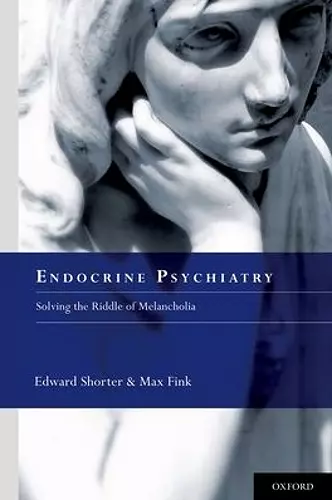Endocrine Psychiatry
Solving the Riddle of Melancholia
Edward Shorter author Max Fink author
Format:Hardback
Publisher:Oxford University Press Inc
Published:27th May '10
Currently unavailable, and unfortunately no date known when it will be back

The riddle of melancholia has stumped generations of doctors. It is a serious depressive illness that often leads to suicide and premature death. The disease's link to biology has been intensively studied. Unlike almost any other psychiatric disorder, melancholia sufferers have abnormal endocrine functions. Tests capable of separating melancholia from other mood disorders were useful discoveries, but these tests fell into disuse as psychiatrists lost interest in biology and medicine. In the nineteenth century, theories about the role of endocrine organs encouraged endocrine treatments that loomed prominently in practice. This interest faded in the 1930s but was revived by the discovery of the adrenal hormone cortisol and descriptions of its abnormal functioning in melancholic and psychotic depressed patients. New endocrine tests were devised to plumb the secrets of mood disorders. Two colorful individuals, Bernard Carroll and Edward Sachar, led this revival and for a time in the 1960s and 1970s intensive research interest established connections between hormone dysfunctions and behavior. In the 1980s, psychiatrists lost interest in hormonal approaches largely because they did not correlate with the arbitrary classification of mood disorders. Today the relation between endocrines and behavior have been disregarded. This history traces the enthusiasm of biological efforts to solve the mystery of melancholia and their fall. Using vibrant language accessible to family care practitioners, psychiatrists and interested lay readers, the authors propose that a useful, a potentially live-saving connection between medicine and psychiatry, has been lost.
"Is the timing right for this sort of publication? Probably. As the title implies a fall has occurred so it is hard to say whether it will be of interest. In reality I would say rise, fall, another rise with the concept of CRH antagonists for depression in the 1990s and in the past couple of years (peaking now) another all because they don't work for depression. Dr. Fink is an internationally known expert on ECT. . . . I would buy a copy and enjoyed reading the chapters provided." --E. Sherwood Brown, M.D., P.h.D Associate Professor, Director, Psychoneuroendocrine Research Program, Department of Psychiatry, University of Texas Southwestern Medical Center Dallas, TX "Dr. Max Fink is one of the originators of modern psychiatric therapeutics, and his historical perspectives would be of interest. I personally would buy this book." --Owen M. Wolkowitz, MD Professor of Psychiatry, UCSF School of Medicine San Francisco, CA "With a strategic organization, the book effectively provides the necessary introduction in the first several chapters, while the latter chapters present the challenges and shortcomings of endocrine psychiatry." --Doody's
ISBN: 9780199737468
Dimensions: 155mm x 236mm x 20mm
Weight: 476g
208 pages